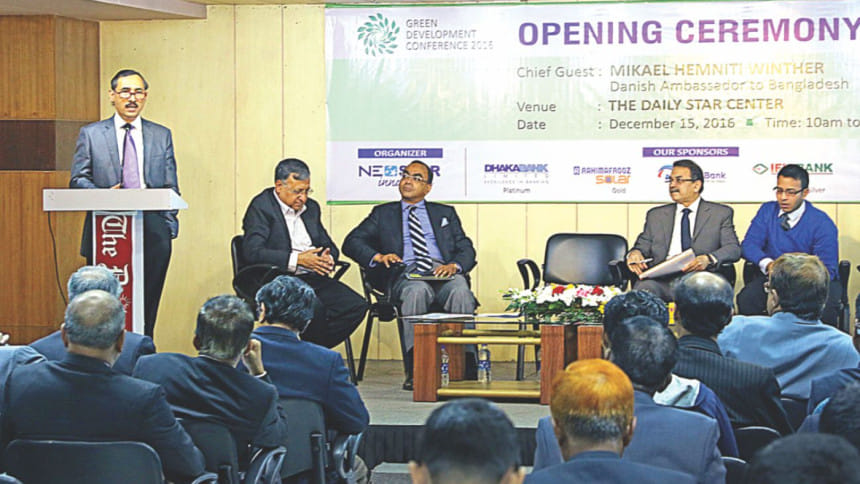Green bonds on the horizon

The government plans to issue a green bond to facilitate low-cost financing of environment-friendly and sustainable initiatives in Bangladesh, an official of Sustainable & Renewable Energy Development Authority said yesterday.
“We have already started discussions with the development partners on this issue,” said SREDA Member Siddique Zobair at a daylong conference held at The Daily Star Centre.
NeoSTAR Innovation, a green technology-focused company, in association with Dhaka Bank, Rahimafrooz Solar, NCC Bank, IFIC Bank and Social Islami Bank organised the event to discuss policies for green business, explore effective business models and identify low-cost financing opportunities.
The rate of interest is relatively high to make a green project commercially viable, Zobair said.
Banks charge 9 percent interest on lending to green projects under Bangladesh Bank's Tk 200 crore revolving fund, formed in 2009 to give out low-cost loans for solar energy, biogas and effluent treatment ventures.
Under the scheme, the central bank provides funds to financial institutions at 5 percent interest, which they lend out for renewable energy projects at 9 percent interest.
Zobair said it would not be difficult for the BB, and commercial banks could cut down interest rate to 6-7 percent.
Renewable and sustainable initiatives are relatively new in Bangladesh and many bankers are not aware of green energy, said Syed Mahbubur Rahman, managing director and chief executive of Dhaka Bank.
The attitude of bankers and board members is important to facilitate increased financing for green projects, he said, while calling for more involvement from board members.
Rahman also floated the idea of a green economic zone. The operating costs are relatively high for green projects and the channel to access green finance is narrow, said Dipal C Barua, president of Bangladesh Solar & Renewable Energy Association.
Investment return in green schemes is slower than expected, he added.
Some 36 garment factories in Bangladesh have LEED certification, one of the most popular green building certification programmes used worldwide, said Faruque Hassan, senior vice-president of Bangladesh Garment Manufacturers and Exporters Association. “Three of them are the highest rated in the world,” he added.
Huge funds are needed to set up green factories and buildings, but interest rate is high and the payback period is less, Hassan added.
TIM Rawshan Zadeed, executive vice-president and head of SME & Green Banking of IFIC Bank, said banks can reduce the rate of interest if the BB cuts the rate.
Danish Ambassador to Bangladesh Mikael Hemniti Winther, who inaugurated the event, said consistency in policy is important. Some kind of predictability in policy is needed.
“Your obligation is to protect your own country against climate change,” he added.
The industrial units altogether consume nearly 50 percent of energy and the residential units 30 percent, said Shah Maksudul Gani, head of sales of Rahimafrooz Renewable Energy Ltd.
Energy efficiency and conservation can reduce the energy requirements by almost 15 percent in the industrial sector, while the use of energy-efficient appliances can bring down energy consumption by up to 36 percent in residences, he said.
With the 22.5 million tonnes of municipal waste produced in Bangladesh every year, 10,823 GWh of electricity can be produced and 9.2 million homes can be lightened, said Muhammad Taif Ul Islam, operations officer of clean energy at International Finance Corporation.

 For all latest news, follow The Daily Star's Google News channel.
For all latest news, follow The Daily Star's Google News channel. 




Comments